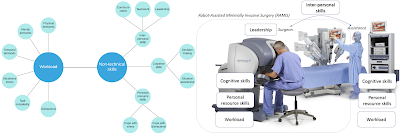Article intro - Non-Technical Skill Assessment and Mental Load Evaluation in RAMIS
Abstract
BACKGROUND: Sensor technologies and data collection practices are changing and improving quality metrics across various domains. Surgical skill assessment in Robot-Assisted Minimally Invasive Surgery (RAMIS) is essential for training and quality assurance. The mental workload on the surgeon (such as time criticality, task complexity, distractions) and non-technical surgical skills (including situational awareness, decision making, stress resilience, communication, leadership) may directly influence the clinical outcome of the surgery. METHODS: A literature search in PubMed, Scopus and PsycNet databases was conducted for relevant scientific publications. The standard PRISMA method was followed to filter the search results, including non-technical skill assessment and mental/cognitive load and workload estimation in RAMIS. Publications related to traditional manual Minimally Invasive Surgery were excluded, and also the usability studies on the surgical tools were not assessed. RESULTS: 50 relevant publications were identified for non-technical skill assessment and mental load and workload estimation in the domain of RAMIS. The identified assessment techniques ranged from self-rating questionnaires and expert ratings to autonomous techniques, citing their most important benefits and disadvantages. CONCLUSIONS: Despite the systematic research, only a limited number of articles was found, indicating that non-technical skill and mental load assessment in RAMIS is not a well-studied area. Workload assessment and soft skill measurement do not constitute part of the regular clinical training and practice yet. Meanwhile, the importance of the research domain is clear based on the publicly available surgical error statistics. Questionnaires and expert-rating techniques are widely employed in traditional surgical skill assessment; nevertheless, recent technological development in sensors and Internet of Things-type devices show that skill assessment approaches in RAMIS can be much more profound employing automated solutions. Measurements and especially big data type analysis may introduce more objectivity and transparency to this critical domain as well. SIGNIFICANCE: Non-technical skill assessment and mental load evaluation in Robot-Assisted Minimally Invasive Surgery is not a well-studied area yet; while the importance of this domain from the clinical outcome’s point of view is clearly indicated by the available surgical error statistics.




Comments